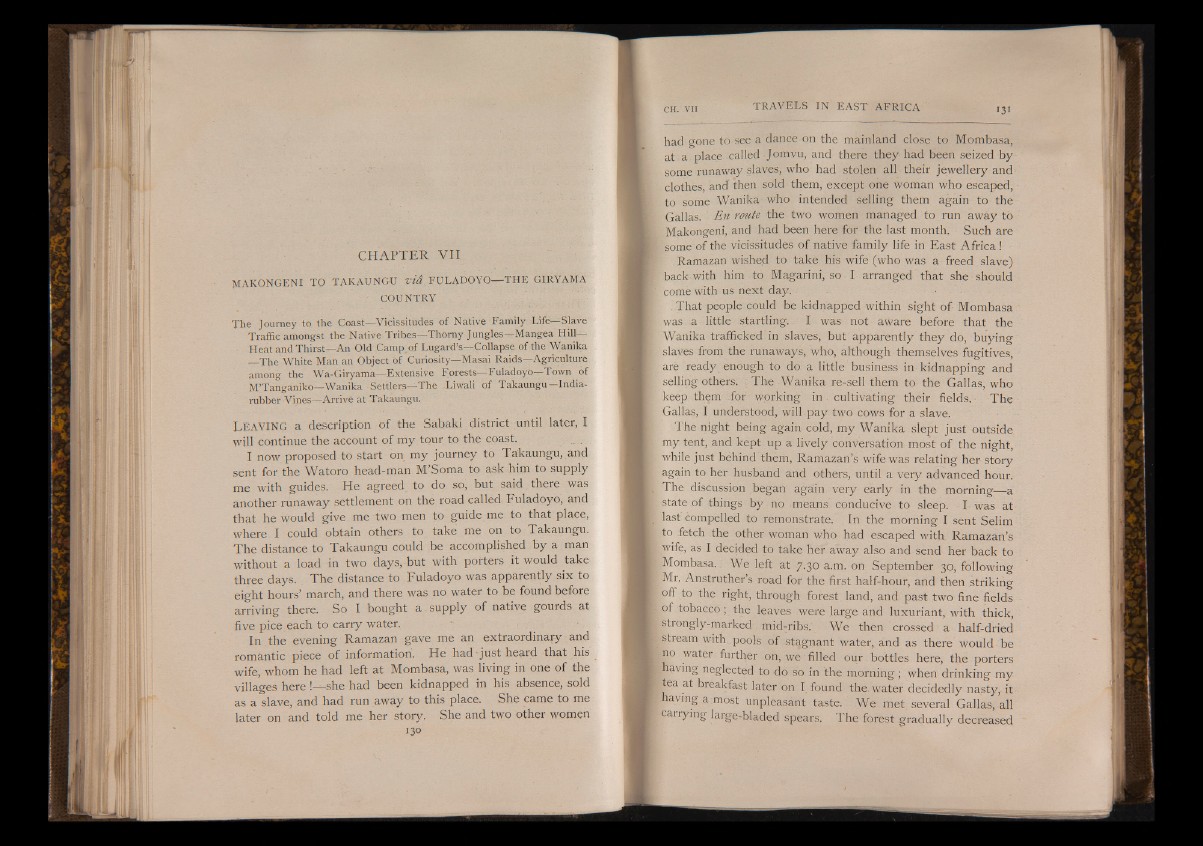
CH A P T ER V II
MAKONGENI TO TAKAUNGU via FULADOYO— THE GIRYAMA
COUNTRY
The Journey to the Coast— Vicissitudes of Native Family Life— Slave
Traffic amongst the Native Tribes— Thorny Jungles—Mangea Hill—
Heat and Thirst— An Old Camp.of Lugard’s— Collapse of the Wanika
— The White Man an Object of Curiosity— Masai Raids—Agriculture,
among the Wa-Giryama— Extensive Forests— Fuladoyo—Town of
M’Tanganiko— Wanika Settlers— The Liwali of Takaungu—India-
rubber Vines— Arrive at Takaungu.
L e a v in g a description of the Sabaki district until later, I
will continue the account of my tour to the coast.
I now proposed to start on my journey to Takaungu, and
sent for the Watoro head-man M’Soma to ask him to supply
me with guides. He agreed to do so, but said there was
another runaway settlement on the road called P uladoyo, and
that he would give me two men to guide me to that place,
where I could obtain others to take me on to Takaungu.
The distance to Takaungu could be accomplished by a man
without a load in two days, but with porters it would take
three days. The distance to Fuladoyo was apparently six to
eight hours’ march, and there was no water to be found before
arriving there. So I bought a supply of native gourds at
five pice each to carry water.
In the evening Ramazan gave me an extraordinary and
romantic piece of information. He had - just heard that his
wife, whom he had left at Mombasa, was living in one of the
villages here L—^-she had been kidnapped in his absence, sold
as a slave, and had run away to this place. She came to me
later on and told me her story. She and two other women
130
had gone to see a dance on the mainland close to Mombasa,
at a place called Jomvu, and there they had been seized by
some runaway slaves, who had stolen all their jewellery and
clothes, and then sold them, except one woman who escaped,
to some Wanika who intended selling them again to the
Gallas. En route the two women managed to run away to
Makongeni, and had been here for the last month. Such are
some of the vicissitudes of native family life in East Africa !
Ramazan wished to take his wife (who was a freed slave)
back with him to Magarini, so I arranged that she should
come with us next day.. .
That people could be kidnapped within sight o f Mombasa
was a little startling.. I was not aware before that the
Wanika trafficked in slaves, but apparently they do, buying
slaves from the runaways, who, although themselves fugitives,
are ready enough to do a little business in kidnapping and
selling others. The Wanika re-sell them to the Gallas, who
keep them for working in cultivating their fields.- The
Gallas, I understood, will pay two cows for a slave.
The night being again cold, my Wanika slept just outside
my tent, and kept up a lively conversation most of the night,
while just behind them, Ramazan’s wife was relating her story
again to her husband and others, until a very advanced hour.
The discussion began again very early in the morning;—a
state of things by no means, conducive to sleep. I was at
last compelled to remonstrate. In the morning I sent Selim
to fetch the other woman who had escaped with Ramazan’s
wife, as I decided to take her away also and send her back to
(Mombasa. We left at 7,30 a.m. on September 30, following
Mr. Anstruther’s road for the first half-hour, and then striking
off to the right, through forest land, and past two fine fields
of tobacco; the leaves were large and luxuriant, with thick,
.strongly-marked mid-ribs.' We then crossed a half-dried
stream with, pools of stagnant water, and as there would be
;n° water : further on, we filled our bottles here, the porters
I Jiving neglected to do so in the morning; when drinking my
;tea at breakfast later on I found the. water decidedly nasty, it
aving a most unpleasant taste. We met several Gallas, all
carrying large-bladed spears. 1 he forest gradually decreased